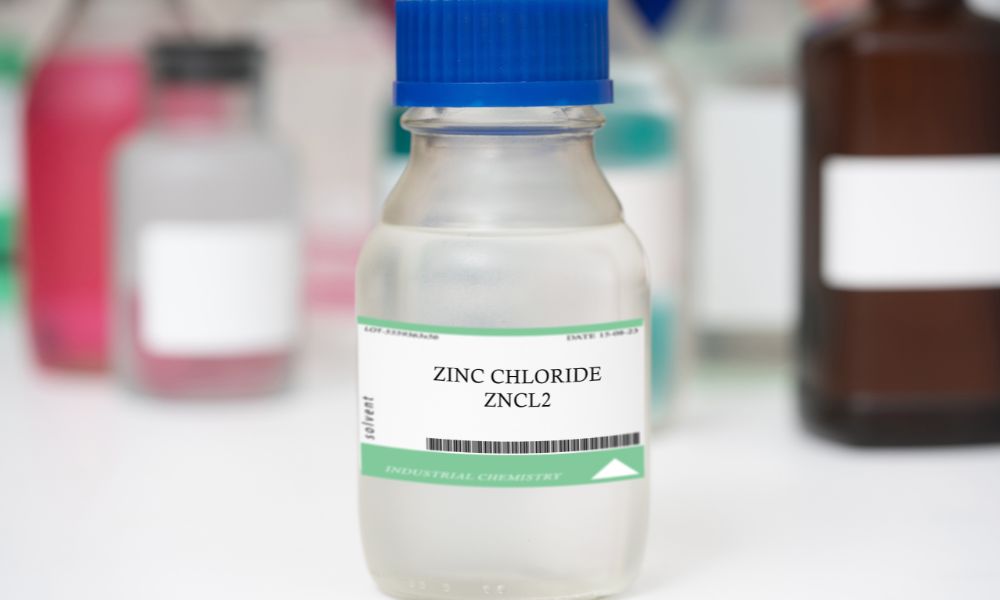Laboratories are home to many chemicals that power reactions and analyses. One such essential chemical is zinc chloride (ZnCl2). This compound plays a pivotal role in a myriad of laboratory tests, anchoring the reliability and accuracy of findings.
Explore the multi-faceted uses of zinc chloride in laboratory testing, its benefits, applications, and most importantly, how to handle it with caution. Whether you’re a laboratory professional looking to expand your supplies or a prospective chemistry student, you should understand this component and its impact on lab experiments.
Understanding Zinc Chloride
Before exploring zinc chloride’s significance in laboratories, we’ll share its properties and applications. Zinc chloride is a white, crystal-like solid that is soluble in water. Its hygroscopic nature allows it to absorb moisture from its surroundings, making it a key player in various chemical processes.
Properties and Characteristics
Zinc chloride has remarkably high boiling and melting points (1,350 degrees Fahrenheit and 554 degrees Fahrenheit, respectively), showcasing its stability and practicality across various uses in the laboratory. Its hygroscopic nature grants it effective dehydrating functions. Zinc chloride is a key component in various processes that necessitate dry conditions, which we will explore in its lab applications.
Benefits of Zinc Chloride Testing
Using zinc chloride in laboratory testing offers many benefits. Here are some reasons you may want to pick up this compound for your own studies.
Enhances Accuracy
Zinc chloride enhances the precision of titrations and chemical tests. It maintains anhydrous (water-free) conditions crucial for various reactions. Zinc chloride also provides a consistent environment for accurate measurements and observations by ensuring water does not act as a variable.
Improves Reliability of Results
Because it can dehydrate environments, zinc chloride plays an indirect but vital role in maintaining test system integrity. It minimizes the chances of false positives and negatives, which are the bane of any laboratory professional’s work. By creating stable environments, ZnCl2 ensures your results are accurate and trustworthy for further testing.
Offers Cost-Effective Solutions
Zinc chloride is cost-effective because small amounts can go a long way in your experiments. Your lab can rely on this compound to provide the desired effects of the trial without breaking the bank on reagent costs, which is crucial in laboratories with budget constraints. Many suppliers, including Post Apple Scientific, offer zinc chloride and other compounds in bulk, which can help you save on material costs.
Applications of Zinc Chloride in Laboratory Testing
Now that you understand the basics of this material, we can look at the areas within laboratory testing where zinc chloride plays a key role.
Synthesize Organic Products
Zinc chloride is a crucial condensing agent in the lab. Because it promotes chemical transformations in a water-free environment, it’s useful in a wide range of scientific processes. For instance, it aids in producing dyes, phenols, and many organic compounds.
Particularly significant in pharmaceuticals, cosmetic chemistry, and material science, ZnCl2 is pivotal for orchestrating organic reactions in a controlled, dehydrated setting.
Manufacture Chemicals and Solvents
This material also works as a starting ingredient for various chemicals and as a solvent in fluxes and metallurgical applications. Due to its safety profile and reliability, zinc chloride is common in many manufacturing processes. Zinc chloride is even popular for making batteries and as an electrolyte for galvanizing other metals.
Disinfecting and Dehydration
Zinc chloride acts as a disinfectant by denaturing proteins, making it an effective mineralizing agent for organic tissues. This also makes it ideal for preserving biological samples. Medical laboratories often use this material for preparing tissue specimens for microscopy due to its dehydrating nature.
Electrolytes in Dry Cells
Zinc chloride plays a role as an electrolyte, providing ionic conductivity in dry cell batteries. Its long storage times and low self-discharge make it ideal for crafting batteries and other manufacturing goods. Its low conductivity in water solutions makes it viable for electrolyte solutions, providing the necessary charge-carrying functions without causing unwanted reactions with other chemicals.
Safety Precautions for Working With Zinc Chloride
While ZnCl2 can be a boon to your laboratory, it’s imperative to handle it with care. Here are some handling guidelines and safety precautions your lab staff should follow when working with zinc chloride.
Potential Hazards and Precautions
Zinc chloride is corrosive and can cause severe burns on contact with the skin or eyes. Inhalation can lead to respiratory irritation, and ingestion may cause gastrointestinal distress. Laboratory professionals of all levels should use caution and follow their facility’s safety procedures while handling zinc chloride. In case of contact with the skin or eyes, thoroughly wash the affected area with water, and seek medical attention if necessary.
Handling Guidelines
When working with zinc chloride, you must wear appropriate personal protective equipment (PPE), including gloves, goggles, and lab coats. Always work in a ventilated area, as the compound can cause irritation in the respiratory tract.
Safe Storage
Store zinc chloride in a dry place away from direct sunlight and incompatible materials to prevent unwanted reactions. Also, keep it in an airtight container to prevent moisture absorption.
Your chemical supplier and the labeling on the product itself will provide detailed storage instructions. When you order your chemicals and solvents from a trusted supplier, you will notice clear labeling and handling instructions on the products. If you’re wondering where to buy zinc chloride, you’ve come to the right place. Post Apple Scientific offers high-quality, lab-grade chemicals, solvents, and a variety of other supplies.
Zinc chloride’s reliable performance in a variety of laboratory tests, comprehensive applications, cost-effectiveness, and contributions to the accuracy of test results make it a must-have chemical component.
Understanding the benefits of zinc chloride and its role in laboratory testing can make your processes more effective. Post Apple Scientific takes pride in being part of the laboratory supply chain, providing quality ZnCl2 and other laboratory reagents to promote high-quality studies and scientific discoveries.
Browse our website to learn more about the role of zinc chloride in laboratory testing or explore our range of chemicals and labware. We’re dedicated partners in your laboratory’s success and ensuring your studies have a strong, reliable foundation.


